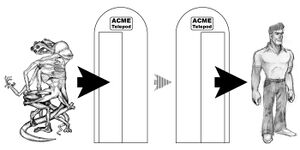Teleportation
“How are we supposed to find out what the consequences are if we don't try it?”
A means of going instantly from one place to another without having to appear in the space between. Also known as "plot device." There are two main kinds, both of which were invented in 1866 by famous American inventor Thomas Edison.
Apparent Natural Teleportation[edit]
Most evident with Vikings,cats, gossip, kitsune and the money in your bank account. This is the most common type, but scientific research has yet to prove it (with the exception of money, which has been caught on film sneaking out of the bank).
Scientific Teleportation[edit]
Teleportation was first hypothesized by Ultra Jesus during the War of 1812. He wished there existed a way for his penguin allies to more easily move to and from Mars, rather than transport the entire landmass of Antarctica. His dreams of military applications of teleportation were not to be realized until, in 1866, famous American inventor Thomas Edison invented the worlds first, biggest and best teleporter. Rumours persist that during World War 3D, the Russians secretly had the technology to teleport homoerotic pornography into soldiers' bunkers. This is disputed.
Pornography, however, did become the first thing ever teleported in the lab (This is of course similar to the way pornography drove the creative advancements of photography, computers, twinkies, television, vibrating mobile phones, soap, fluorescent lighting, the wheel, and Oscar Wilde) when an issue of "Page 3: The Girls of K-Mart" was dematerialized and rematerialized 7 meters away.
Modern research into teleportation has split to three paths:
Beaming[edit]
Beaming, or matter transmission. The object to be teleported is recorded on a quantum level (and subsequently destroyed, as you cannot observe something without changing it (sort of like a n00b on Undictionary)), the data then transmitted to another site where it is mistaken for the source code for DeCSS, and deleted.
This method has not seen much in the area of actual advancement, mostly because the scientists use it to steal pornography and ice cream.
Classical Matter Transmission[edit]
A variation in which the object to be teleported is recorded without any regard for the consequences of observing it, and the electronic data is then posted on the Internet and downloaded by anyone who wants to receive the teleported object and has a compatible materialiser. The original object is then destroyed, because it's fun to smash stuff. The differences from beaming are:
- Duplicates of the object can be created as many times as you like, assuming you have enough energy to do so (more or less the power of 3 exploding planets)
- The electronic data can be stored on a USB key. This is handy for sneaking liquids onto an airplane.
- If you're not careful, anyone can download the data and recreate the object as many times as the like. Attempting to teleport money will result in the collapse of the economy.
- If you teleport an antique family heirloom that belonged to your grandfather and a cowl of cottage cheese comes out the other end, this means your grandfather was insane.
- Teleporting living creatures may result in duplicates being accidentally created. The resulting identity crisis leads to the end of civilisation as we know it and/or sitcoms.
- Do not teleport anything boring. If you don't get enough hits on your website, the object will never reappear.
- Teleporting people may cost them their immortal soul.
Tunnelling[edit]
Physical object transportation, similar to wormhole theory, is where an object either a) travels from point A to point B through a rip or along a fold in space, b) accelerates to lightspeed by changing to a particle/wave or massive hyperneutrino, or c) attaches itself to a female shopper and announces to her the location of a sale near it's destination. All of these methods physically transport the matter making up the object, rather than create a quantum copy. This method is approved by the RIAA.
Drugs[edit]
Sufficient dosages of drugs can induce an object and it's observers to think it has moved. Far out man.
Scientific Calculations[edit]
Scientists have invented an equation for teleportation:

\therefore \delta =\pi r^{2}[\circledast =U]}](https://en.wikipedia.org/api/rest_v1/media/math/render/svg/3484df5399395bdd2adff8d6177a5a2edcf40ab8)